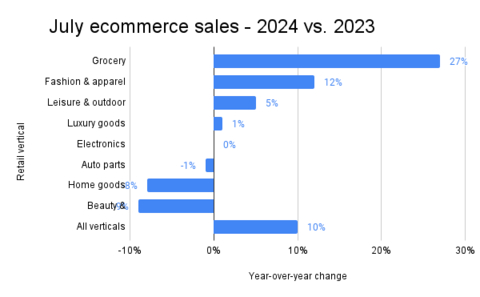Signifyd data shows ecommerce sales are still growing, but consumers are relying on discounts and low-cost options as merchants ponder what it means for the coming holiday shopping season
The heart of the back-to-school shopping season saw consumers shift their online spending to lower-cost items and alternatives, signaling that economic stressors might finally be translating into significant consumer caution, according to ecommerce data released by Signifyd today.
This press release features multimedia. View the full release here: https://www.businesswire.com/news/home/20240814301210/en/

July ecommerce sales - 2024 vs. 2023 (Graphic: Business Wire)
Key findings from July Ecommerce Pulse data
- Online spending continued to grow annually in July, but the fastest growth was in orders under $100. Meanwhile, purchases above $500 were nearly flat year over year.
- Clues to the health of the upcoming holiday shopping season remained elusive. Overall online spending was up 10% annually, but growth was powered by discounts and consumers trading down for cheaper items.
- Average order value was down 4% compared to July 2023, signaling caution among consumers.
Are indefatigable consumers becoming fatigued?
“What we saw in July was not surprising given recent macroeconomic trends,” Signifyd CEO Raj Ramanand said. “Online retail remains healthy, but clearly economic uncertainty and the decline in surplus savings are weighing on consumers. We’ve entered an era during which merchants need to focus on profitable growth rather than growth at any cost. This is the time for brands to develop lasting customer value by doubling down on the long-term relationships they build with the customers they serve.”
Retailers that focus on the long game will have an opportunity to make up for smaller cart sizes by encouraging customers to return to them over the long haul.
Consumers are trading down in an uncertain economy
“The decline in average order value is somewhat worrisome,” said Signifyd Senior Data Analyst Phelim Killough. “Add to that the fact that cart size — or the number of items per order — was down 9% and it’s a less-than-glowing report. Higher overall spending, lower average order value and smaller cart sizes tell the story of consumers who are trading down and finding cheaper options for the things they need.”
A look at how consumers were spending in July underscores Killough’s point. Overall, the number of ecommerce orders increased by 15% in July compared to a year ago. The growth was driven by lower-cost purchases. Breaking down average spending per order into $100 increments, Signifyd found that orders under $100 increased 17.7% compared to July 2023. Conversely, orders over $500 rose only 1.5% over a year ago.
Economists have been warning that consumer spending — a growth engine that has been roaring since the end of the pandemic — could not run at turbo speed forever. Record savings, bolstered by pandemic stimulus payments, are dwindling and strong employment growth dipped in July, briefly panicking equity markets.
| Ecommerce sales July 2024 vs. July 2023 | |
Grocery |
+27% |
Fashion & apparel |
+12% |
Leisure & outdoor |
+5% |
Luxury goods |
+1% |
Electronics |
0% |
Auto parts |
-1% |
Home goods |
-8% |
Beauty & cosmetics |
-9% |
All verticals |
+10% |
Reflecting the confounding nature of the economy overall, shoppers spent robustly in some retail verticals in July while pulling back in others. Traditional back-to-school and back-to-college verticals were a mixed bag. Apparel spending was up 12% over a year ago, while electronics remained flat and home goods spending dropped 8%.
Back-to-school shopping surfaces wants and needs
On the spectrum of back-to-school wants and needs, some apparel is a must-have, while a mid-range laptop can substitute for the top-of-the-line and maybe it’s cinder blocks and boards rather than a new bookcase for that off-campus apartment.
Discounts also played a role in back-to-school shopping. The average applied discount in the electronics category was 12%. Fashion shoppers enjoyed an average discount of 22%, about the same as last year. Home goods discounts averaged nearly 29% or 3% higher than a year ago, but even those deals weren’t enough to spur shoppers to push home goods spending higher than last July.
The average discount for all transactions across Signifyd’s entire Commerce Network of thousands of retailers was 23.5% — a 3% increase from discounts applied in July 2023.
Grocery spending rose while beauty and cosmetics spending fell
Other verticals that saw notable annual sales fluctuations in July include grocery, leisure and outdoor, and luxury goods. Grocery spending continued a trend that started in the spring, increasing 27% annually. Again in July, the rise in spending was driven by volume not price increases. Auto parts and beauty and cosmetics were in negative territory year-over-year, down 1% and 9% respectively.
Methodology
Signifyd’s Ecommerce Pulse data is derived from transactions on Signifyd’s Commerce Network of thousands of ecommerce retailers and brands. Commerce Network intelligence also powers Signifyd’s Commerce Protection Platform, which leverages AI-driven machine learning models and data from billions of transactions to detect and block fraudulent activity while increasing the number of good orders approved. Signifyd has seen more than 600 million unique shopper wallets1 globally, meaning that 98% of the time when a shopper comes to a Signifyd-protected site, Signifyd’s machine-learning models recognize the shopper instantly.
About Signifyd
Signifyd provides an end-to-end Commerce Protection Platform that leverages its Commerce Network to maximize conversion, automate customer experience and eliminate fraud and consumer abuse risk for retailers. Signifyd, which is the leading provider of payment security and fraud prevention for the Digital Commerce 360 Top 1000 Retailers, is headquartered in San Jose, CA, with locations in Denver, New York, Mexico City, São Paulo, Belfast and London.
1A digital wallet is a distinct combination of signals present in an online transaction.
View source version on businesswire.com: https://www.businesswire.com/news/home/20240814301210/en/
Signifyd data shows ecommerce sales are still growing, but consumers are relying on discounts and low-cost options as merchants ponder what it means for the coming holiday shopping season.
Contacts
Mike Cassidy
Signifyd head of PR & storytelling
mike.cassidy@signifyd.com






